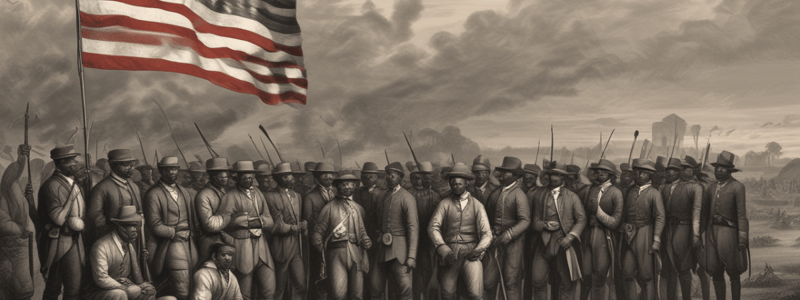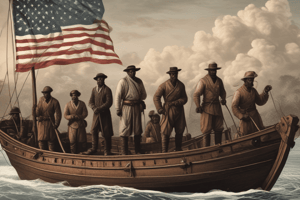Podcast
Questions and Answers
What was the primary goal of slave owners in the South?
What was the primary goal of slave owners in the South?
- To abolish slavery
- To secede from the United States
- To maintain the balance of free and slave states
- To keep slavery a viable and legal institution (correct)
What was the role of moderates like Harriet Beecher Stowe?
What was the role of moderates like Harriet Beecher Stowe?
- To take up arms against the South
- To negotiate with Southern politicians
- To use their writing to raise awareness about the horrors of slavery (correct)
- To write novels glorifying slavery
What was the ultimate goal of militant abolitionists like John Brown?
What was the ultimate goal of militant abolitionists like John Brown?
- To established a separate nation for freed slaves
- To convince the government to abolish slavery
- To take the fight to the South through violence if necessary (correct)
- To peacefully negotiate with the South
What would happen if the South failed to maintain the balance of free and slave states?
What would happen if the South failed to maintain the balance of free and slave states?
What was the attitude of abolitionists towards the use of violence?
What was the attitude of abolitionists towards the use of violence?
What was the main goal of the moderate politicians on both sides in the 1820s?
What was the main goal of the moderate politicians on both sides in the 1820s?
What was the result of the California territory's petition to be admitted to the Union as a free state?
What was the result of the California territory's petition to be admitted to the Union as a free state?
What was the main purpose of the Fugitive Slave Act?
What was the main purpose of the Fugitive Slave Act?
What was the outcome of the Compromise of 1850?
What was the outcome of the Compromise of 1850?
What was Harriet Beecher Stowe's weapon of choice against slavery?
What was Harriet Beecher Stowe's weapon of choice against slavery?
What event triggered Harriet Beecher Stowe to become more involved in the abolitionist movement?
What event triggered Harriet Beecher Stowe to become more involved in the abolitionist movement?
What was unique about Harriet Beecher Stowe's writing of Uncle Tom's Cabin?
What was unique about Harriet Beecher Stowe's writing of Uncle Tom's Cabin?
What was the impact of Uncle Tom's Cabin on its readers?
What was the impact of Uncle Tom's Cabin on its readers?
What was the significance of the characters in Uncle Tom's Cabin?
What was the significance of the characters in Uncle Tom's Cabin?
What was a notable adaptation of Uncle Tom's Cabin?
What was a notable adaptation of Uncle Tom's Cabin?
Flashcards are hidden until you start studying
Study Notes
Slavery in the 1850s
- The United States was experiencing political tension in 1850, with the issue of slavery creating a divide between the North and South.
- In the South, slave owners held power and worked to keep slavery legal and viable.
- Moderate abolitionists like Harriet Beecher Stowe used literature to raise awareness about the horrors of slavery, while militant abolitionists like John Brown were willing to use violence to end slavery.
The Missouri Compromise
- The Missouri Compromise of 1820 maintained a balance between free and slave states.
- The compromise allowed slavery in newer territories west of the Mississippi River.
The Consequences of the Mexican War
- The Mexican War led to the United States acquiring new territory, which raised questions about whether new states would be free or enslaved.
- The California territory petitioned to be admitted to the Union as a free state, threatening the balance between free and enslaved states.
The Compromise of 1850
- The Compromise of 1850 admitted California as a free state, allowed citizens to vote on whether to be free or enslaved, and passed the Fugitive Slave Act.
- The Fugitive Slave Act required citizens to assist in the recovery of fugitive enslaved people, denied them the right to a jury trial, and put more emphasis on the federal government to enforce slave laws.
The Response of Abolitionists
- The Fugitive Slave Act led to increased activity in the Underground Railroad, which helped enslaved people escape to freedom.
- Harriet Beecher Stowe wrote Uncle Tom's Cabin, a novel that raised awareness about the plight of enslaved people and became a catalyst for many to become more involved in the abolitionist movement.
Harriet Beecher Stowe and Uncle Tom's Cabin
- Harriet Beecher Stowe was a writer who became increasingly aware of the plight of enslaved people and wrote Uncle Tom's Cabin in response.
- The novel was a seminal work of abolitionist literature, featuring memorable characters like Uncle Tom, Simon Legree, and Eva.
- The novel was influential in raising awareness about slavery and was translated into multiple languages, becoming a classic of American literature.
Studying That Suits You
Use AI to generate personalized quizzes and flashcards to suit your learning preferences.




